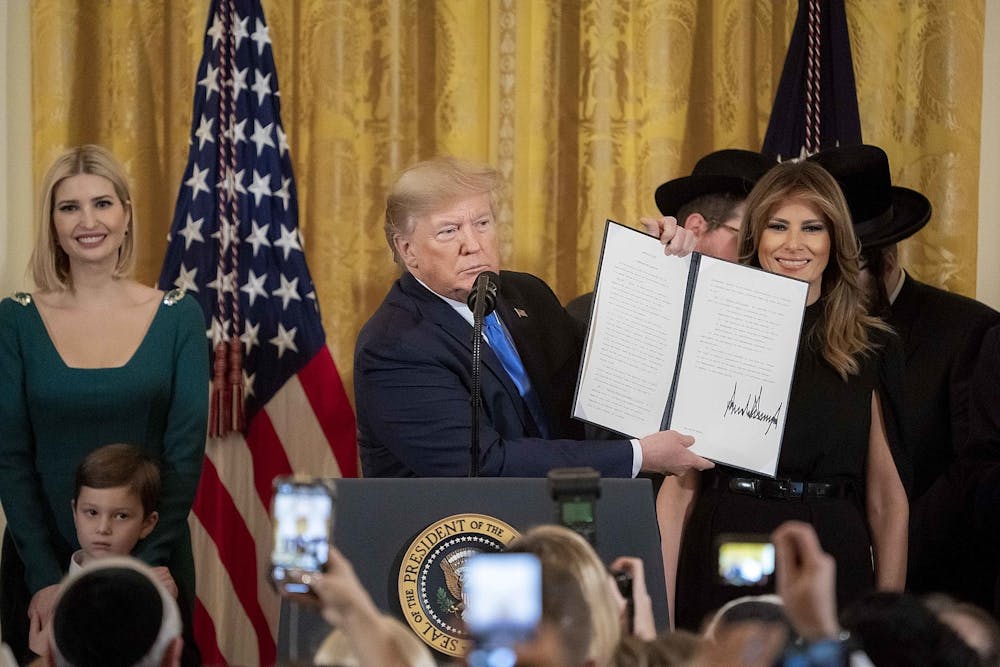It is a tough time to be a Jew in college. Over the past decade, college campuses have seen a rise in anti-Semitism, ranging from swastikas and grafiti using Nazi language being painted on apartments and dorms — including a Jewish student’s apartment at GrandMarc — to fake eviction notices handed out to Jewish students at New York University, to anti-Semitic videos posted on a George Washington University student’s Snapchat story.
Much of the anti-Semitic behavior falsely claims that Jewish students are responsible for the actions of Israel. All Jews are assumed to be Zionists, and any student who believes in Zionism — Jewish self-determination in the land of Israel — is assumed to support every action of the current Israeli government. Regardless of one’s views of Israel, holding Jewish students accountable for the actions of a foreign government is anti-Semitic.
On Dec. 11 2019, President Donald Trump signed an executive order expanding Title VI of the Civil Rights Act to include anti-Semitism. Title VI — which prohibits discrimination based on “race, color, or national origin”— does not seem to include Jews. But in 2010, President Barack Obama issued a similar guideline, expanding Title VI to apply to Jewish students, as well as Sikh and Muslim students, on college campuses because he recognized that discrimination against these religious groups is often based on their perceived ethnic or national characteristics.
While the order seems to be a positive, it may also make it easier to pursue legal action against critics of Israel. This would dangerously limit the free speech of students. It would also turn the anti-Semitism faced by Jewish students into a political tool.
There is good reason for this fear, as Trump has made numerous anti-Semitic comments, allied himself with white supremacists, and emboldened attacks such as the massacre at Pittsburgh’s Tree of Life synagogue.
In a speech to the Israeli American Council in Florida, Trump told the Jewish audience that they had no choice but to vote for him because his adversary, Senator Elizabeth Warren, D-Mass., would take away their money, invoking the anti-Semitic stereotype portraying Jews as meiserly. Based on this comment, accompanied by a slew of other anti-Semitic comments that the president has made, I can only believe that the purpose of this order is to manipulate anti-Semitism to suppress students on the left.
The University is not exempt from this problem. An example that is all too personal to me is the Jewish Leadership Council’s strained relationship with the student-run Minority Rights Coalition. I, alongside many Jewish classmates, felt fear, loneliness and marginalization after the Unite the Right Rally in August 2017. Neo-Nazis took to the streets on our Grounds chanting, “Jews will not replace us.” Because we understood the importance of solidarity with other oppressed groups, we sought to join the MRC and ensure Jewish students had a home on Grounds.
The MRC denied entry to JLC, denying access to the only Jewish organizing body. Although the MRC cited its reason for rejecting us as a connection to Israel, the fact that they include organizations with varying and sometimes contradictory political stances made it feel personal. Moreover, two years later in August 2019, MRC described its organization as anti-Zionist on its activities fair poster, while mentioning no other discreet group of people, thereby only allowing a Jewish group to apply to join if they deny their own right to self-determination.
Many Jewish students felt that this singling out of the Jewish state was offensive, and I, as the newly elected chair of JLC, saw it as an opportunity to talk about Zionism and anti-Zionism in a pluralistic and open space. After trying to organize such a conversation for months and being told by various MRC leaders that it would be “too divisive,” I left Grounds at the end of the semester disappointed and feeling just as isolated as I had after August 2017.
While I wish that the president’s anti-Semitism meant that the anti-Semitism this order tries to address did not exist, it unfortunately does. Student groups at universities all over the country exclude and demonize Jewish students because of a real or perceived connection to Israel. This is discriminatory, and it is unacceptable that we continue to let it happen here.
The irony of the MRC and the president’s executive order is that they both seek to stifle their adversaries’ speech. Groups like the MRC refuse to accept Jewish students as part of a legitimate minority unless they deny their own right to self-determination. Trump tries to limit the ability of groups critical of Israel to express that belief without being condemned as anti-Semitic. Students at the University need to do better than the president and engage with those we disagree with instead of attempting to silence them.
Zack Szlezinger is a fourth-year student in Batten and current president of the JLC. This column reflects Szlezinger’s personal opinion and not that of the Brody Jewish Center, JLC or any other organization of which he is a part.







